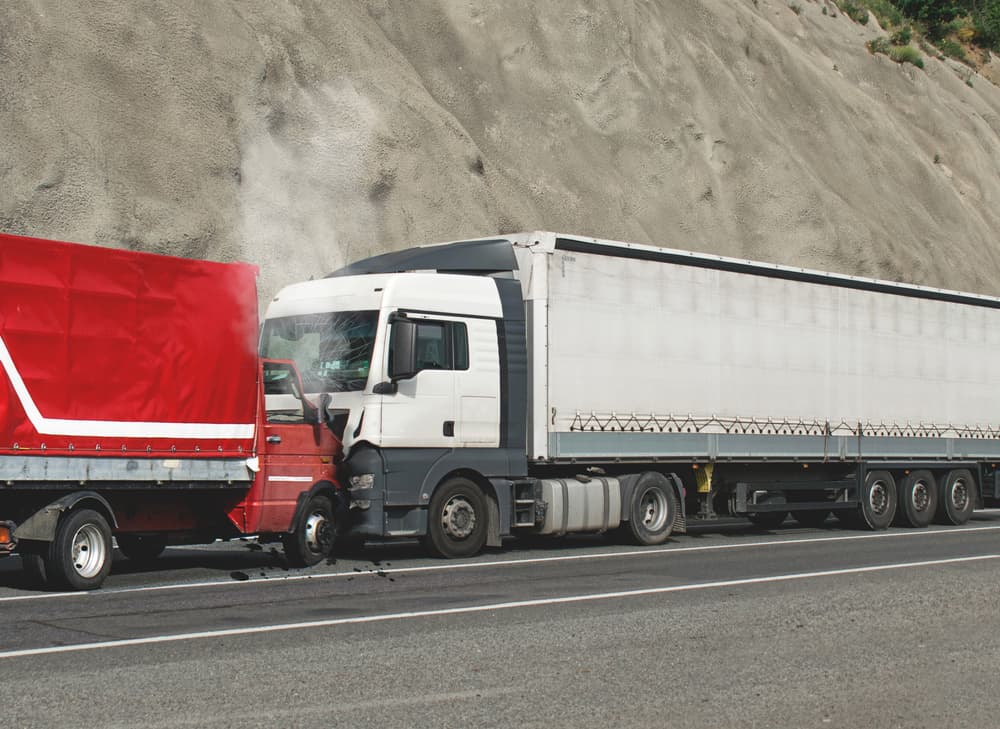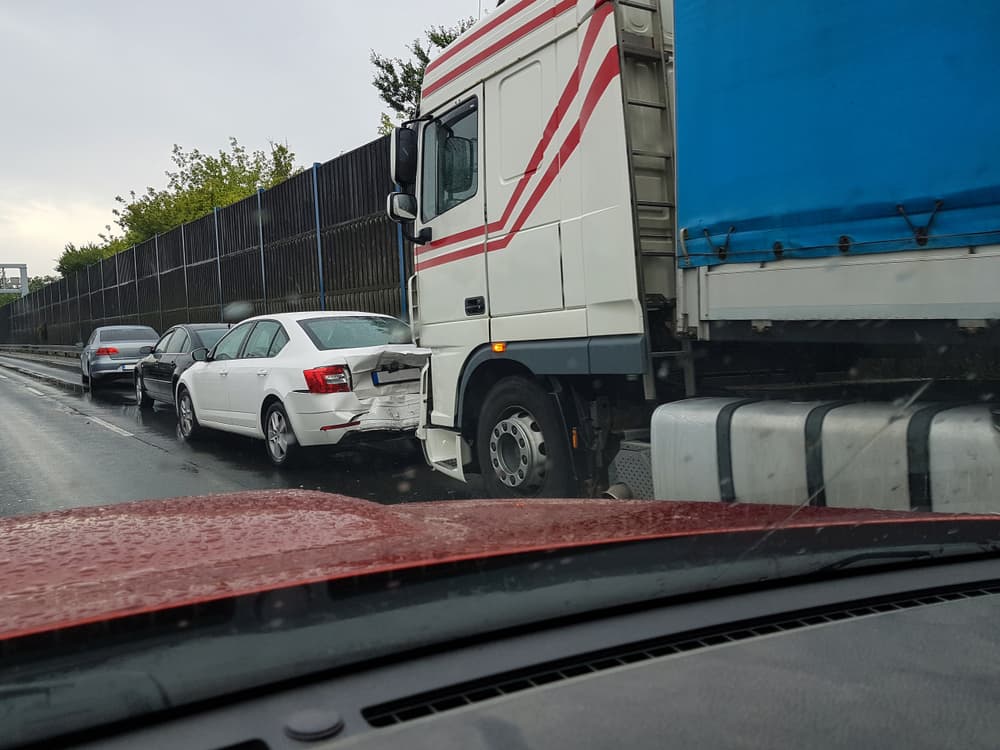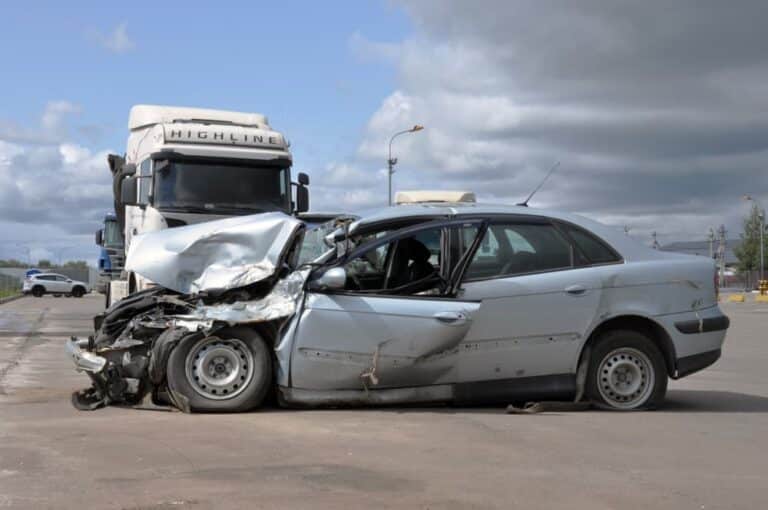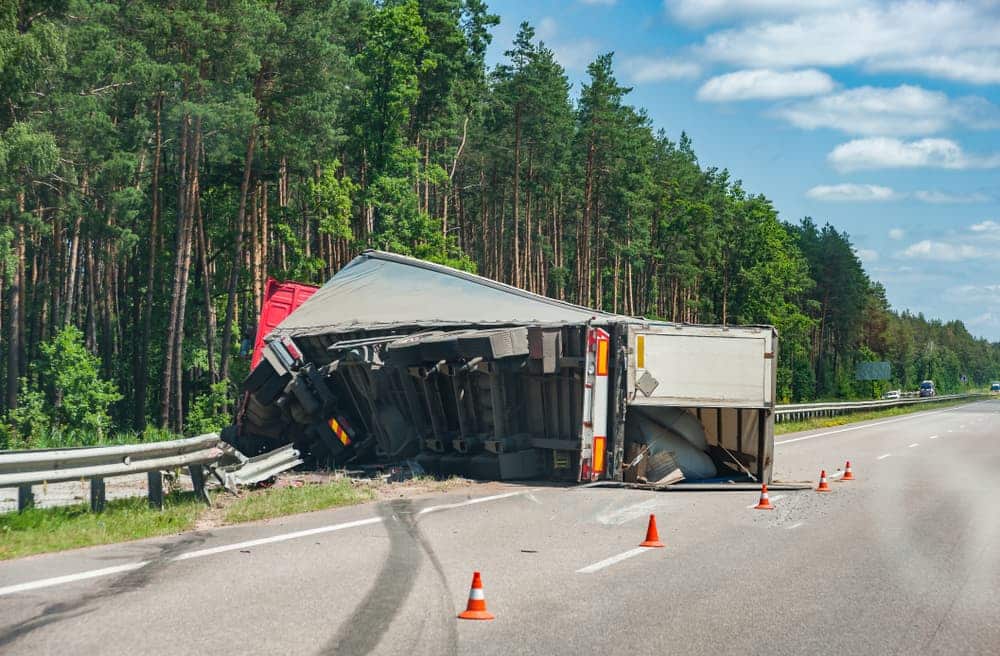Even if you already suffered harm in a truck accident, knowing about the different types of crashes involving commercial vehicles guides you in identifying the specific behaviors or safety violations that caused the accident. It also strengthens your position when discussing the incident with your truck accident lawyer, insurance companies, or in court.
The Most Common Types of Truck Accidents
Understanding the main types of truck accidents allows you to identify how a collision happened and spot the evidence necessary to prove your claim. It might also help you to avoid them.
Head-on Truck Accidents

Head-on truck accidents occur when a truck’s front end collides with another vehicle’s front end. These collisions are often severe due to the direct nature of the impact and the truck’s size.
They commonly result from a truck entering the wrong lane or crossing a median, which can happen if the driver is drowsy or distracted or loses control of the vehicle. The consequences of such accidents are typically catastrophic, especially at high speeds or on highways.
Rear-End Truck Accidents

In rear-end truck accidents, a truck crashes into the back of the vehicle ahead. The large size and considerable weight of trucks mean these accidents can cause significant damage, even at lower speeds.
Common causes include the truck driver following too closely, being unable to stop in time due to high speed or heavy loads, and brake failures. The force of impact is particularly dangerous for passengers in the rear-ended vehicle.
Sideswipe Truck Accidents
Sideswipe truck accidents occur when a truck’s side makes contact with another vehicle’s side. These accidents usually occur during lane changes, such as when a truck driver doesn’t notice another vehicle in their blind spot.
Some also happen when truck drivers unintentionally drift out of their lanes due to distraction or inattention. Sideswipe accidents can force other vehicles off the road or into other lanes, sometimes leading to further collisions.
T-Bone Truck Accidents

T-bone accidents happen when the front of a truck hits the side of another vehicle or vice versa. These collisions most commonly occur at intersections and are often extremely dangerous due to the perpendicular impact.
Typical causes include running red lights, failing to yield the right of way, or not stopping at stop signs. The vehicle that sustains the hit on its side is especially vulnerable as the sides of cars generally offer less protection than the front or rear.
Underride Truck Accidents
An underride accident occurs when a smaller vehicle goes under the trailer of a truck. This type of accident is often deadly, as the top of the car often gets crushed or sheared off by the rigid underside of the trailer.
These accidents frequently happen when trucks stop suddenly, and the cars behind them cannot brake in time. They can also occur if a truck driver changes lanes or makes a wide turn without noticing other cars beside or behind them.
Rollover Truck Accidents

Truck rollovers involve the truck tipping over onto its side or roof. These can result from various factors such as speeding, taking turns too sharply, driving in high winds, or driving with unbalanced cargo.
Rollovers are particularly hazardous as they can result in the truck blocking the roadway or falling onto or colliding with other vehicles, sometimes causing secondary accidents.
Jackknife Truck Accidents
In a jackknife accident, the truck’s trailer swings out too wide and forms an acute angle as it closes in on the cab, like a folding pocket knife. This often occurs during sudden braking or if the driver loses control during a sharp turn.
Jackknife accidents are highly dangerous as out-of-control trailers can sweep across multiple lanes or collide with nearby vehicles before they come to a stop.
Cargo Spill Truck Accidents
Cargo spills happen when a truck’s load bursts out of the trailer and spills out onto the roadway, sometimes creating considerable road hazards or colliding with other vehicles.
These accidents can create significant obstacles, especially if the cargo is hazardous material or in large pieces. Common causes include improper cargo securement, overloaded cargo, or structural failure of the cargo container due to accidents or poor maintenance.
Wide Turn Truck Accidents
Wide turn accidents happen when a truck swings wide to complete a turn. Trucks do not turn tightly, so they often need to swing left before making right turns, creating a risk for vehicles directly beside them.
This maneuver significantly increases the risk of collisions, especially in urban areas with tighter streets and more traffic.
Mechanical Defect Truck Accidents
Mechanical defect accidents result from failures in a truck’s components, such as brakes, tires, or steering mechanisms. Poor maintenance or inherent defects in these parts can lead to such accidents.
Mechanical failures can cause truck drivers to lose control of their vehicles, sometimes leading to collisions, rollovers, or other accidents. Regular maintenance and inspections can prevent these accidents.
Why Are Truck Accident Cases More Complex?
Truck accident cases are often more complex than other types of accident cases for several reasons, including the following:
- Multiple Liable Parties: Truck accidents often involve more parties than typical car accidents. Along with the truck driver, you might need to consider the trucking company, the company responsible for loading the truck, and even truck parts manufacturers. Each of these entities can share responsibility for the accident. This makes the legal process more complex as it involves identifying and negotiating with multiple stakeholders, each with their own insurance and legal representation.
- Severe Injuries and Damage: Trucks can cause more severe injuries and damage than standard vehicles due to their size and weight. Victims often face life-changing injuries, long-term rehabilitation, or permanent disability. This results in higher medical expenses and the need for long-term care or compensation for lost income. The severity of the damage often leads to more complex legal proceedings, as determining fair compensation for these extensive losses involves detailed medical and financial analyses.
- Federal and State Regulations: Truck drivers and trucking companies are subject to numerous federal and state regulations that don’t apply to regular vehicles. These include strict rules about driving hours, rest periods, truck maintenance, and cargo loading. Legal professionals know these rules, which allows them to build strong cases for their clients if any violations contributed to the accident.
- Complex Evidence: Truck accident cases often involve analyzing complex evidence. This includes data from the truck’s electronic logging device, which records information about the truck’s speed, direction, and critical systems when accidents or near-accidents occur. It could also include GPS data showing the truck’s route and speed or records of the driver’s work schedule and rest breaks. This technical data requires careful examination by experts to understand the circumstances of the accident and to identify any regulatory violations or other evidence of negligence.
- Insurance Issues: Trucking companies usually have more extensive insurance policies than those for personal vehicles due to the higher risk associated with large trucks. These policies can involve significant sums, and dealing with trucking insurance companies is often challenging. They have experienced legal teams dedicated to minimizing payouts in accident claims. Reaching settlements with these companies requires a keen understanding of insurance law and strong negotiation skills.
- Cargo-Related Issues: If the accident involves a cargo spill, especially if the cargo is hazardous, this adds another layer of complexity. Strict regulations govern transporting hazardous materials, and spills can lead to environmental damage and public safety risks. Handling cargo spill accident cases requires knowledge of these specific regulations and the potential long-term effects of cargo spills.
Who Is Liable for a Truck Accident?
Before claiming fair compensation for your truck accident injury claim, you must identify the party or parties liable for the incident. Depending on the circumstances, one or several of the following parties could be liable:
Truck Drivers
The truck driver could be liable if their actions contributed to the accident in any way. This includes situations where the driver was speeding, driving under the influence of alcohol or drugs, or driving while drowsy.
If the driver was violating traffic laws or distracted, such as by using a cell phone, they could be responsible for resulting collisions. The driver’s history, including past accidents or traffic violations, could also be relevant in establishing liability.
Trucking Companies
The trucking company could also be liable, especially if its negligence contributed to the accident. This could include poor maintenance of the truck, not following safety regulations, or hiring drivers without proper background checks or training.
If the company pressured the driver to meet unrealistic schedules, which led to speeding or driving without adequate rest, this could also make them liable.
Cargo Loaders
Companies or individuals responsible for loading the truck’s cargo might be liable if improper loading contributed to the accident. Overloading a truck or unevenly distributing the cargo’s weight can affect the truck’s stability and braking, possibly leading to accidents.
If the cargo loaders failed to secure the cargo properly, causing it to shift or fall off during transit, they could be liable for subsequent collisions.
Truck Manufacturer or Parts Manufacturer
If the accident was due to a mechanical failure, such as brake failure or a tire blowout, the manufacturer of the truck or the specific part could be liable. This is especially true if the equipment is defective or fails to meet safety standards.
Liability could also extend to manufacturers if they knew about a defect but failed to issue a recall or warn users.
Maintenance Providers
Maintenance providers are responsible for ensuring that trucks are in safe working condition. If poor maintenance is a factor in the accident, the parties responsible for maintaining the truck could be liable. This includes situations where no one performed routine maintenance checks or when responsible parties failed to make necessary repairs or completed them improperly.
Other Drivers
Sometimes, other drivers on the road can contribute to or cause truck accidents. For example, if another vehicle cuts off the truck in traffic, causing the truck driver to swerve or brake suddenly, that driver might be liable. Liability can extend to any motorist or road user whose actions directly contributed to the truck accident.
Government Entities or Road Contractors
If the accident resulted from poor road conditions, such as potholes, lack of proper signage, or faulty traffic signals, the government entity responsible for road maintenance could be liable.
Similarly, if road construction occurred without proper warnings or management, the construction contractors might be responsible for any resulting accidents.
How Do Lawyers Prove Fault in Truck Accident Cases?
When pursuing truck accident injury claims, lawyers meticulously gather a wide array of evidence to build a strong case. This evidence can prove liability, determine the extent of injuries, and ensure that the injured party receives fair compensation.
Here are some key examples:
- Police accident reports
- Witness statements
- Truck driver’s logbooks
- Truck maintenance records
- Photos of the accident scene
- Surveillance footage from nearby cameras
- Dashcam footage
- Truck’s black box data
- Cell phone records
- Alcohol and drug test results
- Expert witness testimony
- Truck driver employment records
- Truck company’s safety records
- GPS data from the truck
- Weigh station records
- Traffic citations
- Weather and traffic reports
- Vehicle inspection reports
- Cargo loading records
- Road condition reports
- Driver qualification files
- Records of previous accidents involving the truck or driver
- Physical evidence from the accident scene
Do You Need a Truck Accident Lawyer?

Yes. Having a lawyer is essential if you suffer harm in a truck accident. Lawyers are deeply familiar with legal procedures and traffic laws and can skillfully interpret and apply these laws to your advantage. Lawyers also know how to negotiate with insurance companies, often recovering far more compensation than individuals could obtain alone.
Truck accident lawyers rigorously gather and analyze evidence, such as driver logs and black box data, to build compelling cases. Furthermore, they offer useful guidance on the value of your claim and adeptly handle complex liability issues involving multiple parties, which commonly occur in truck accidents.
Ultimately, a Phoenix personal injury attorney maximizes your chances of a favorable outcome, providing you with peace of mind during a challenging time.